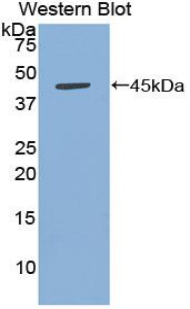Polyclonal Antibody to B-Cell Activation Factor Receptor (BAFFR)
CD268; TNFRSF13C; TNFRSF13-C; BAFF-R; BAFFR; BR3; Tumor Necrosis Factor Receptor Superfamily Member 13C
- Product No.PAA281Ga01
- Organism SpeciesChicken (Gallus) Same name, Different species.
- SourcePolyclonal antibody preparation
- HostRabbit
- Potencyn/a
- Ig Type IgG
- PurificationAntigen-specific affinity chromatography followed by Protein A affinity chromatography
- LabelNone
- Immunogen RPA281Ga01-Recombinant B-Cell Activation Factor Receptor (BAFFR)
- Buffer Formulation0.01M PBS, pH7.4, containing 0.05% Proclin-300, 50% glycerol.
- TraitsLiquid
- Concentration0.52mg/ml
- Organism Species Moren/a
- ApplicationsWB; IHC; ICC; IP.
If the antibody is used in flow cytometry, please check FCM antibodies. - DownloadInstruction Manual
- UOM 20µl100µl 200µl 1ml 10ml
- FOB
US$ 103
US$ 239
US$ 342
US$ 855
US$ 3420
For more details, please contact local distributors!
SPECIFITY
The antibody is a rabbit polyclonal antibody raised against BAFFR. It has been selected for its ability to recognize BAFFR in immunohistochemical staining and western blotting.
USAGE
Western blotting: 0.5-2µg/mL;1:260-1000
Immunohistochemistry: 5-20µg/mL;1:26-100
Immunocytochemistry: 5-20µg/mL;1:26-100
Optimal working dilutions must be determined by end user.
STORAGE
Store at 4°C for frequent use. Stored at -20°C in a manual defrost freezer for two year without detectable loss of activity. Avoid repeated freeze-thaw cycles.
STABILITY
The thermal stability is described by the loss rate. The loss rate was determined by accelerated thermal degradation test, that is, incubate the protein at 37°C for 48h, and no obvious degradation and precipitation were observed. The loss rate is less than 5% within the expiration date under appropriate storage condition.
GIVEAWAYS
INCREMENT SERVICES
-
 Antibody Labeling Customized Service
Antibody Labeling Customized Service
-
 Protein A/G Purification Column
Protein A/G Purification Column
-
 Staining Solution for Cells and Tissue
Staining Solution for Cells and Tissue
-
 Positive Control for Antibody
Positive Control for Antibody
-
 Tissue/Sections Customized Service
Tissue/Sections Customized Service
-
 Phosphorylated Antibody Customized Service
Phosphorylated Antibody Customized Service
-
 Western Blot (WB) Experiment Service
Western Blot (WB) Experiment Service
-
 Immunohistochemistry (IHC) Experiment Service
Immunohistochemistry (IHC) Experiment Service
-
 Immunocytochemistry (ICC) Experiment Service
Immunocytochemistry (ICC) Experiment Service
-
 Flow Cytometry (FCM) Experiment Service
Flow Cytometry (FCM) Experiment Service
-
 Immunoprecipitation (IP) Experiment Service
Immunoprecipitation (IP) Experiment Service
-
 Immunofluorescence (IF) Experiment Service
Immunofluorescence (IF) Experiment Service
-
 Buffer
Buffer
-
 DAB Chromogen Kit
DAB Chromogen Kit
-
 SABC Kit
SABC Kit
-
 Long-arm Biotin Labeling Kit
Long-arm Biotin Labeling Kit
-
 Real Time PCR Experimental Service
Real Time PCR Experimental Service
| Magazine | Citations |
| Reproductive BioMedicine Online | Soluble BAFF-R produced by decidual stromal cells plays an inhibitory role in monocytes and macrophages ScienceDirect: S1472648312001484 |
| Basrah Journal of Veterinary Research | HISTOMORPHOLOGICAL AND IMMUNEHISTOCHEMICAL STUDY OF POSTNATAL DEVELOPMENT OF THYMUS IN |
| The Iraqi Journal of Veterinary Medicine | Immunehistochemical and Histomorphological Study of Postnatal Development of the cecal tonsils in Turkey (Meleagris Gallopavo) |
| Catalog No. | Related products for research use of Chicken (Gallus) Organism species | Applications (RESEARCH USE ONLY!) |
| RPA281Ga01 | Recombinant B-Cell Activation Factor Receptor (BAFFR) | Positive Control; Immunogen; SDS-PAGE; WB. |
| PAA281Ga01 | Polyclonal Antibody to B-Cell Activation Factor Receptor (BAFFR) | WB; IHC; ICC; IP. |






